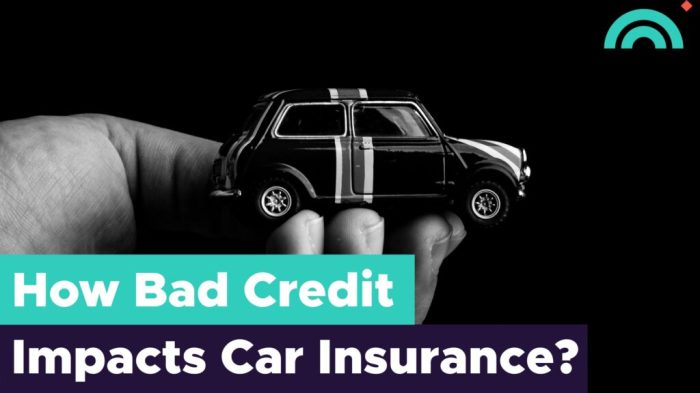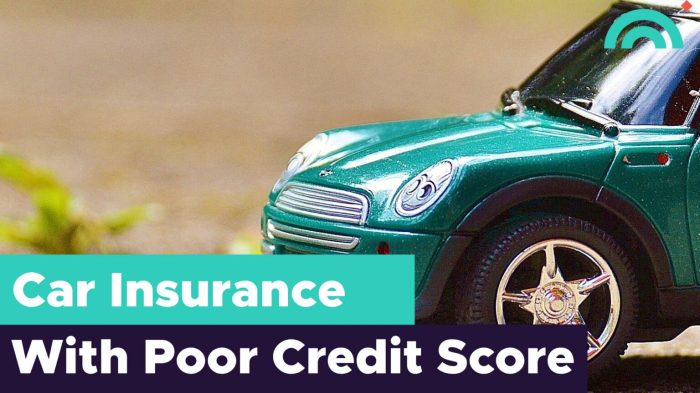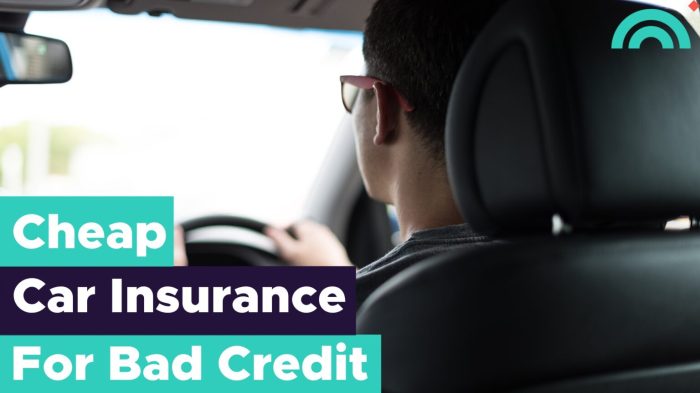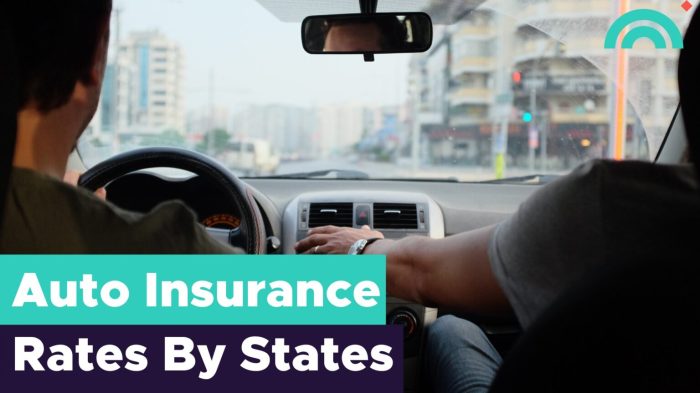Best car insurance providers for people with bad credit can be a challenge to find. Many insurance companies use your credit score as a factor in determining your premiums, and a low credit score can lead to higher rates.
But don’t worry, there are still options available! This guide will explore how credit scores impact car insurance, strategies for improving your credit, and resources for finding affordable coverage.
We’ll delve into the factors that influence car insurance rates for those with bad credit, such as driving history, age, and vehicle type. We’ll also examine how insurance companies adjust rates based on these factors and provide insights into the best car insurance providers for high-risk drivers.
Whether you’re looking for comprehensive coverage or just the basics, we’ll help you navigate the world of car insurance and find the right policy for your needs.
Understanding Credit Scores and Car Insurance
Your credit score is a numerical representation of your financial responsibility, and it plays a surprising role in determining your car insurance premiums. While you might think your driving record is the only factor, insurance companies often use your credit score to assess your overall risk.
How Insurance Companies Use Credit Scores to Assess Risk
Insurance companies believe that people with good credit are more likely to be responsible drivers and less likely to file claims. This isn’t always the case, but it’s a correlation that many insurers use to set premiums. Here’s why they use credit scores:
- Predicting Risk:Insurance companies analyze large datasets to identify patterns between credit scores and claim frequency. They’ve found a statistical link between good credit and fewer claims, leading them to view individuals with higher credit scores as lower-risk drivers.
- Financial Responsibility:A good credit score indicates a history of responsible financial management. Insurance companies see this as a positive sign that you’re more likely to be financially responsible and handle unexpected expenses, like car repairs or medical bills, without filing unnecessary claims.
- Assessing Overall Risk Profile:Credit scores provide a comprehensive picture of your financial situation. This helps insurers understand your overall risk profile, not just your driving record.
Credit Score Ranges and Their Potential Impact on Premiums
Your credit score falls within a specific range, and this range directly impacts your car insurance premiums. Here are some examples:
| Credit Score Range | Potential Impact on Premiums |
|---|---|
| Excellent (740-850) | Lower premiums due to a lower perceived risk. |
| Good (670-739) | Moderately lower premiums. |
| Fair (580-669) | Slightly higher premiums. |
| Poor (300-579) | Significantly higher premiums, as you’re considered a higher risk. |
Factors Influencing Car Insurance Rates for People with Bad Credit
While your credit score is a significant factor in determining your car insurance rates, it’s not the only one. Insurance companies consider various factors to assess your risk and calculate your premiums. Understanding these factors can help you make informed decisions to potentially lower your rates.
Driving History
Your driving history is a crucial factor in determining your car insurance rates. A clean driving record with no accidents or traffic violations will generally result in lower premiums. Conversely, a history of accidents, speeding tickets, or DUI convictions can significantly increase your rates.
Insurance companies use a system called a “risk score” to assess your driving history. This score is based on your driving record and other factors like your age and location. A higher risk score indicates a higher likelihood of accidents, leading to higher premiums.
For example, a driver with a history of three accidents in the past five years may have a higher risk score than a driver with a clean driving record. As a result, the driver with the higher risk score will likely pay higher premiums.
Age
Your age also plays a role in determining your car insurance rates. Younger drivers, especially those under 25, are statistically more likely to be involved in accidents. This increased risk is reflected in higher premiums for young drivers. As drivers age and gain more experience, their premiums generally decrease.
Vehicle Type
The type of vehicle you drive is another significant factor influencing your car insurance rates. Luxury cars, high-performance vehicles, and vehicles with advanced safety features typically have higher premiums. This is because these vehicles are often more expensive to repair or replace in the event of an accident.Insurance companies also consider the safety features of your vehicle, such as airbags, anti-lock brakes, and electronic stability control.
Vehicles with more safety features tend to have lower premiums.
Location
Your location, including your zip code, can significantly affect your car insurance rates. This is because insurance companies consider the risk of accidents in different areas. Areas with high crime rates or heavy traffic congestion tend to have higher premiums.
Other Factors
Beyond these core factors, other elements can also influence your car insurance rates. These include:
- Marital status:Married individuals often have lower premiums than single individuals. This is because married couples tend to be more responsible drivers.
- Gender:In some states, men pay higher premiums than women. This is due to historical data showing men are more likely to be involved in accidents.
- Education level:Drivers with higher education levels may have lower premiums, as they are often perceived as more responsible and knowledgeable about safe driving practices.
- Occupation:Some occupations, like those involving frequent travel or long commutes, may result in higher premiums.
- Driving habits:If you drive long distances or frequently drive at night, you may have higher premiums. Insurance companies may also offer discounts for drivers who use telematics devices that track their driving habits.
Best Car Insurance Providers for People with Bad Credit

Finding affordable car insurance with bad credit can be a challenge, but it’s not impossible. Many insurance companies cater to high-risk drivers, offering competitive rates and coverage options. Let’s explore some of the best providers for people with less-than-perfect credit.
Car Insurance Providers for High-Risk Drivers
Here’s a table comparing some of the top car insurance providers specializing in high-risk drivers. This information will help you find the best option for your needs and budget.
| Provider | Coverage Options | Discounts | Customer Service | Reviews and Ratings |
|---|---|---|---|---|
| Progressive | Comprehensive, collision, liability, personal injury protection, uninsured/underinsured motorist | Safe driver, good student, multi-car, multi-policy | Excellent customer service, available 24/7 | 4.5 out of 5 stars on Trustpilot, 4.3 out of 5 stars on J.D. Power |
| State Farm | Comprehensive, collision, liability, personal injury protection, uninsured/underinsured motorist | Safe driver, good student, multi-car, multi-policy | Excellent customer service, available 24/7 | 4.2 out of 5 stars on Trustpilot, 4.1 out of 5 stars on J.D. Power |
| Geico | Comprehensive, collision, liability, personal injury protection, uninsured/underinsured motorist | Safe driver, good student, multi-car, multi-policy | Excellent customer service, available 24/7 | 4.4 out of 5 stars on Trustpilot, 4.2 out of 5 stars on J.D. Power |
| Nationwide | Comprehensive, collision, liability, personal injury protection, uninsured/underinsured motorist | Safe driver, good student, multi-car, multi-policy | Excellent customer service, available 24/7 | 4.1 out of 5 stars on Trustpilot, 3.9 out of 5 stars on J.D. Power |
| USAA | Comprehensive, collision, liability, personal injury protection, uninsured/underinsured motorist | Safe driver, good student, multi-car, multi-policy | Excellent customer service, available 24/7 | 4.7 out of 5 stars on Trustpilot, 4.6 out of 5 stars on J.D. Power |
Remember, it’s crucial to compare quotes from multiple providers to find the best rates and coverage for your specific needs.
Strategies for Improving Credit Score and Lowering Insurance Premiums

Improving your credit score can significantly reduce your car insurance premiums. It’s a win-win situation, as you benefit from lower insurance costs and a better financial standing.
Strategies for Improving Credit Score
Boosting your credit score requires consistent effort and discipline. Here are some proven strategies to help you improve your credit score:
- Pay Bills on Time:Consistent on-time payments are crucial for building a positive credit history. Set reminders and automate payments to ensure you never miss a deadline. Late payments negatively impact your credit score, so prioritize paying your bills promptly.
- Keep Credit Utilization Low:Credit utilization refers to the amount of credit you’re using compared to your total available credit. Aim to keep your utilization below 30%. A high utilization ratio signals to lenders that you’re heavily reliant on credit, which can lower your credit score.
- Avoid Opening Too Many New Accounts:Each time you apply for a new credit card or loan, a hard inquiry is placed on your credit report. Too many inquiries can lower your score. Focus on managing your existing accounts responsibly rather than opening new ones.
- Become an Authorized User:If you have a close friend or family member with good credit, ask them to add you as an authorized user on their credit card. Their positive credit history can positively impact your score.
- Dispute Errors on Your Credit Report:Check your credit report for any errors. You can request a free copy from all three credit bureaus (Equifax, Experian, and TransUnion) annually at AnnualCreditReport.com. If you find any inaccuracies, dispute them with the credit bureau.
Impact on Car Insurance Premiums
Improving your credit score can lead to significant savings on your car insurance premiums over time. As your credit score improves, insurance companies view you as a lower risk and may offer you discounted rates.
- Lower Premiums:By consistently improving your credit score, you can expect to see a reduction in your car insurance premiums. The extent of the discount varies depending on the insurance company and your individual circumstances.
- More Favorable Rates:With a better credit score, you become more attractive to insurance companies, increasing your chances of getting more competitive and favorable rates.
- Improved Financial Standing:A higher credit score not only benefits your insurance premiums but also unlocks better rates on loans, mortgages, and other financial products.
Strategies and Potential Benefits
| Strategy | Potential Benefit |
|---|---|
| Pay Bills on Time | Increased credit score, lower insurance premiums, improved financial standing |
| Keep Credit Utilization Low | Improved credit score, lower insurance premiums, better interest rates on loans |
| Avoid Opening Too Many New Accounts | Protected credit score, reduced risk of negative impact on insurance premiums |
| Become an Authorized User | Increased credit score, potential for lower insurance premiums |
| Dispute Errors on Your Credit Report | Corrected credit score, potential for improved insurance rates |
Alternative Car Insurance Options for People with Bad Credit
If you’re struggling to find affordable car insurance due to a low credit score, don’t despair. There are alternative options available that might provide you with coverage. These options, often referred to as non-standard car insurance, cater to drivers with less-than-perfect credit histories.
While they may not always be the cheapest, they offer a lifeline for those who are denied by traditional insurance companies.
Comparing Non-Standard Car Insurance Providers
Non-standard car insurance providers specialize in insuring drivers who may have difficulty securing coverage through traditional means. They often have more lenient underwriting criteria and consider factors beyond credit scores, such as driving history and the age of the vehicle.
- Pricing:Non-standard car insurance providers typically charge higher premiums compared to traditional companies. This is because they are taking on more risk by insuring drivers with higher risk profiles. However, the premiums can still be lower than the cost of driving without insurance.
- Coverage:The coverage offered by non-standard providers may vary. Some providers offer basic liability coverage, while others offer more comprehensive coverage, including collision and comprehensive coverage.
- Reputation:It’s crucial to research the reputation of any non-standard provider you’re considering. Look for companies with a solid track record of customer satisfaction and financial stability.
Examples of Non-Standard Car Insurance Providers
Here are some examples of non-standard car insurance providers that cater to drivers with bad credit:
- Mercury Insurance:Mercury Insurance is a well-known non-standard car insurance provider that offers coverage in multiple states. They have a reputation for providing affordable rates to drivers with less-than-perfect credit.
- Progressive:Progressive offers a range of insurance options, including non-standard coverage. They use a sophisticated rating system that considers a variety of factors, including credit score, to determine premiums.
- Kemper:Kemper is another non-standard provider that offers a range of coverage options. They are known for their focus on customer service and their ability to provide coverage to drivers with a variety of risk profiles.
Tips for Finding the Right Car Insurance Provider

Finding the right car insurance provider can be a daunting task, especially if you have bad credit. With so many options available, it can be challenging to navigate the process and make an informed decision. But don’t worry, we’re here to help you navigate the process and find the best car insurance provider for your needs.
Comparing Quotes and Obtaining Personalized Recommendations
The first step is to compare quotes from multiple insurance providers. You can use online comparison tools or contact insurance agents directly. This will help you get a clear picture of the rates and coverage options available.Here are some resources that can help you compare quotes:
- Insurance comparison websites:Websites like Policygenius, NerdWallet, and The Zebra allow you to compare quotes from multiple insurance providers in one place. These websites are often user-friendly and can help you save time and money.
- Insurance agents:Working with an insurance agent can be beneficial, as they can provide personalized recommendations based on your individual needs. They can also help you understand the different coverage options and navigate the complex world of car insurance.
- Your state’s insurance department:Many state insurance departments have websites that offer information about car insurance providers and consumer protection resources. You can use these websites to find licensed insurance agents in your area and compare quotes.
It’s important to provide accurate information when comparing quotes. This includes your driving history, vehicle information, and credit score. Be honest and upfront about your driving record, as this will ensure you get the most accurate quotes.
Understanding Policy Terms and Conditions, Best car insurance providers for people with bad credit
Once you have a few quotes, it’s crucial to carefully review the policy terms and conditions. This includes understanding the coverage limits, deductibles, and exclusions.
- Coverage limits:These limits determine the maximum amount the insurance company will pay for covered losses. Make sure the coverage limits are sufficient to cover your potential financial liability in case of an accident.
- Deductibles:This is the amount you pay out of pocket before your insurance coverage kicks in. Higher deductibles usually result in lower premiums, but you will have to pay more in case of an accident.
- Exclusions:These are specific events or situations that are not covered by your insurance policy. Make sure you understand what is and is not covered to avoid any surprises later on.
Don’t hesitate to ask questions if you’re unsure about any of the terms or conditions. You can contact the insurance company directly or reach out to an insurance agent for clarification.
Last Word: Best Car Insurance Providers For People With Bad Credit

Finding car insurance with bad credit can be a daunting task, but it’s not impossible. By understanding how credit scores affect premiums, exploring different options, and taking steps to improve your credit, you can secure affordable coverage that fits your budget.
Remember to shop around, compare quotes, and carefully consider the terms and conditions of each policy before making a decision. With the right information and a little effort, you can find the best car insurance for your unique situation.
Commonly Asked Questions
How can I find out if my credit score is affecting my car insurance rates?
You can contact your insurance company directly and ask about their credit-based insurance scoring practices. You can also check your credit report for free from the three major credit bureaus: Experian, Equifax, and TransUnion.
What if I have a DUI on my record?
A DUI will significantly impact your car insurance rates. You may need to seek out specialized insurance providers that cater to high-risk drivers. It’s essential to be upfront with your insurance company about any driving violations.
